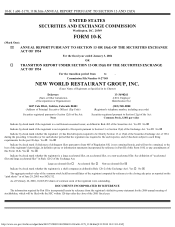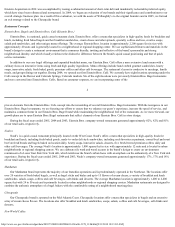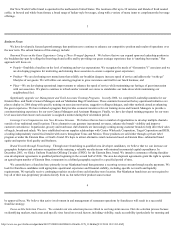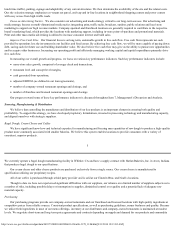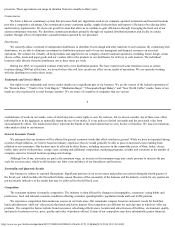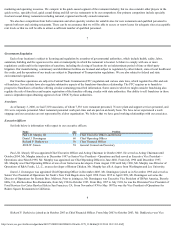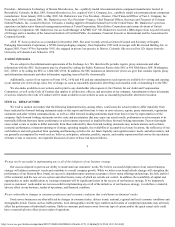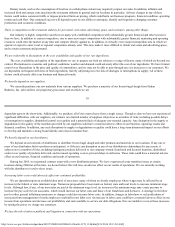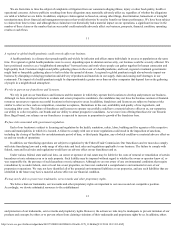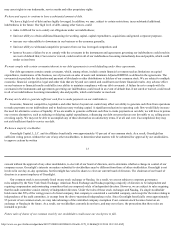Einstein Bros 2005 Annual Report Download - page 8
Download and view the complete annual report
Please find page 8 of the 2005 Einstein Bros annual report below. You can navigate through the pages in the report by either clicking on the pages listed below, or by using the keyword search tool below to find specific information within the annual report.
http://www.sec.gov/Archives/edgar/data/949373/000110465906016136/a06-3178_110k.htm[9/11/2014 10:13:03 AM]
President—Information Technology of Sirenza Microdevices, Inc., a publicly traded telecommunications component manufacturer located in
Broomfield, Colorado. In May 2003, Sirenza Microdevices, Inc. acquired Vari-L Company, Inc., a publicly traded telecommunications component
manufacturer. From January 2001 to May 2003, Mr. Dutkiewicz was Vice President—Finance, Chief Financial Officer of Vari-L Company, Inc.
From April 1995 to January 2001, Mr. Dutkiewicz was Vice President—Finance, Chief Financial Officer, Secretary and Treasurer of Coleman
Natural Products, Inc., located in Denver, Colorado, a leading supplier of branded natural beef in the United States. Mr. Dutkiewicz’ s previous
experience includes senior financial management positions at Tetrad Corporation, MicroLithics Corporation and various divisions of United
Technologies Corporation. Mr. Dutkiewicz was an Audit Manager at KPMG LLP. Mr. Dutkiewicz received a BBA degree from Loyola University
of Chicago and is a member of the American Institute of Certified Public Accountants, Financial Executives International and the Association for
Corporate Growth.
Jill B. W. Sisson joined us as a consultant in December 2003. She most recently served as General Counsel and Secretary of Graphic
Packaging International Corporation, a NYSE-listed packaging company, from September 1992 until its merger with Riverwood Holding, Inc. in
August 2003. From 1974 to September 1992, she engaged in private law practice in Denver, Colorado. She received her J.D. degree from the
University of Colorado Law School in 1974.
Available Information
We are subject to the informational requirements of the Exchange Act. We therefore file periodic reports, proxy statements and other
information with the SEC. Such reports may be obtained by visiting the Public Reference Room of the SEC at 450 Fifth Street, NW, Washington,
D.C. 20549, or by calling the SEC at 1-800-SEC-0330. In addition, the SEC maintains an internet site (www.sec.gov) that contains reports, proxy
and information statements and other information regarding issuers that file electronically.
Additionally, copies of our reports on Forms 10-K, 10-Q and 8-K and any amendments to such reports are available for viewing and copying
at our internet site (www.nwrgi.com), free of charge, as soon as reasonably practicable after filing such material with, or furnishing it to the SEC.
We also make available on our website and in print to any shareholder who requests it, the Charters for our Audit and Compensation
Committees, as well as the Code of Conduct that applies to all directors, officers, and associates of our company. Amendments to these documents
or waivers related to the Code of Conduct will be made available on our website as soon as reasonably practicable after their execution.
ITEM 1A. RISK FACTORS
We wish to caution our readers that the following important factors, among others, could cause the actual results to differ materially from
those indicated by forward-looking statements made in this report and from time to time in news releases, reports, proxy statements, registration
statements and other written communications, as well as verbal forward-looking statements made from time to time by representatives of the
company. Such forward-looking statements involve risks and uncertainties that may cause our actual results, performance or achievements to be
materially different from any future performance or achievements expressed or implied by these forward-looking statements. Factors that might
cause actual events or results to differ materially from those indicated by these forward-looking statements may include matters such as future
economic performance, restaurant openings or closings, operating margins, the availability of acceptable real estate locations, the sufficiency of our
cash balances and cash generated from operating and financing activities for our future liquidity and capital resource needs, and other matters, and
are generally accompanied by words such as: believes, anticipates, estimates, predicts, expects, and similar expressions that convey the uncertainty
of future events or outcomes. An expanded discussion of some of these risk factors follows.
9
We may not be successful in implementing any or all of the initiatives of our business strategy.
Our success depends in part on our ability to understand our customers’ needs. We believe successful deployment of our current business
strategy will address customers’ needs and contribute to overall company growth. While we believe our brand refresh strategy will strengthen the
performance of our Einstein Bros. brand, its success is dependent upon customer acceptance of new menu offerings and pricings, the look and feel
of the restaurant, and the new service system and other factors, many of which are outside our control. In addition, the availability of capital and
opportunities to make modifications to existing restaurants will be significant factors in the success of our business strategy. If we improperly
perceive customers’ needs and/or are not successful in implementing any or all of the initiatives of our business strategy, it could have a material
adverse effect on our business, results of operations, and financial condition.
We are vulnerable to changes in consumer preferences and economic conditions that could harm our financial results.
Food service businesses are often affected by changes in consumer tastes, dietary trends, national, regional and local economic conditions and
demographic trends. Factors such as traffic patterns, local demographics and the type, number and location of competing restaurants may adversely
affect the performance of individual locations. Shifts in consumer preferences away from our type of cuisine and/or the quick casual style could
have a material adverse effect on our results of operations.

